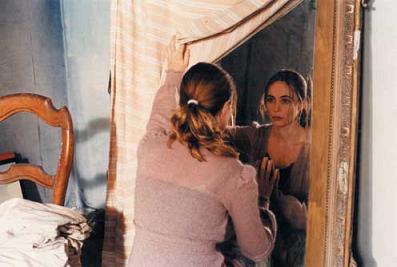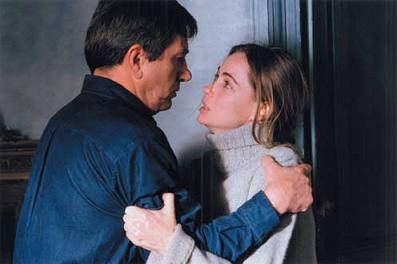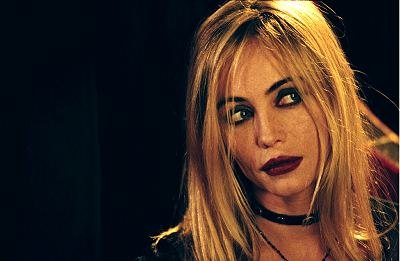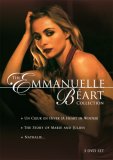| Reviews & Columns |
|
Reviews DVD TV on DVD Blu-ray 4K UHD International DVDs In Theaters Reviews by Studio Video Games Features Collector Series DVDs Easter Egg Database Interviews DVD Talk Radio Feature Articles Columns Anime Talk DVD Savant Horror DVDs The M.O.D. Squad Art House HD Talk Silent DVD
|
DVD Talk Forum |
|
|
| Resources |
|
DVD Price Search Customer Service #'s RCE Info Links |
|
Columns
|
|
|
Emmanuelle Beart Collection, The
The Story of Marie and Julien
The Film:
Exactly twelve years after his brilliant La Belle Noiseuse (1991) one of the true masters in contemporary French cinema Jacques Rivette returns with a project that proves to be as complex as it is demanding. Intended as a cycle of four mythological films Histoire de Marie et Julien dates back to 1970 when it was apparently abandoned by his creator in favor of more lucrative, for the time being, projects. Now brought back to light with a significantly different structure the film relies on such stars as the Rivette favorite Emmanulle Beart (L'Enfer), Anne Brochet (Confidences trop intimes a.k.a Intimate Strangers), Nicole Garcia (La Petite Lili), and Jerzy Radziwilowicz (Secret Defense).
Histoire de Marie et Julien focuses on the relationship between Marie (Emmanuelle Beart) and Julien (Jerzy Radziwilowicz), a clock maker working at home. Having been separated for well over a year both Marie and Julien live their lives unsuspecting that fate has a plan for them. After an unusual dream Julien encounters Marie and the flame of an old affair is quickly rekindled. At first Marie seems receptive to Julien's initiations however when he attempts to get even closer to her she begins to avoid their meetings without an explanation. Strangely enough when Julien suggests that Marie moves to his house she enthusiastically accepts. And once again instead of being more intimate with each other the two lovers grow increasingly distant. There is a secret that lies deep inside Marie's soul which unfortunately Julien is unable to reach. He is saddened, intrigued, and certainly puzzled. In the meantime, Julien has to recollect himself and stay focused as Madame X, a wealthy lady he is blackmailing, has recognized Marrie. But what could Marie and Madam X have in common when they hardly even know each other?
Histoire de Marie et Julien is certainly an acquired taste, a film that demands as much from its viewers as it is willing to give back after the end credits roll. With duration of nearly three hours Jacques Rivette's latest film requires utmost concentration and patience that many may not be willing to spare. For those of you however that allow the famous maestro to lead you Histoire et Marie et Julien will reveal a complex, multi-layered story, which certainly leaves more than one questions for thoughtful analysis.

Just as it was the case with his earlier La belle Noiseuese (1991) and Va Savoir (2001) Jacques Rivette has created a film that takes its viewers on a long and often confusing journey of character exploration. Even when the audience is introduced to Marie and Julien, their mundane routine, their pains and struggles, the film feels as a mosaic where certain pieces require to be aligned perfectly. There are long moments of silence where Rivette lets his camera do the talk placing the actors in a near state of intellectual meditation. In fact, these are the moments when one could certainly draw a parallel between Rivette's slow, arguably pseudo-intellectual, narrative and Marcel L'Herbier's classic fantasy works-it becomes increasingly difficult for the viewer to separate reality from allusion.
What is not difficult to discern however is the pure perfectionism that oozes from the intimate scenes between Marie and Julien. Rivette seems to have reached the very soul of Emanuelle Beart and she is willingly revealing all that her character has to offer, her body, her soul, her physical self. It feels as if Rivette is once again molding her flesh, as he did in La Belle Noiusese, though this time in order to recreate a state of harmony between two lovers where words can hardly substitute what a film camera can show.
Histoire de Marie and Julien is certainly a flawed film as there are too many intellectual overtones one could find difficult to endure. There are moments when it feels as if the story almost comes to a standstill implying that the mystery we have been offered for analysis is just a gimmick added to spice up a purely elitist feature. On the other hand the open for interpretation story could be an enormously rewarding experience especially if you are willing to go a step beyond what the typical for the genre features offer.

How Does the Disc Look?
Presented in its original aspect ratio of 1.85:1 and enhanced for widescreen TV's this R1 version delivered by Koch Lorber Films appears similar to the R2 UK version released by Artificial Eye. I believe that Koch Lorber Films have attempted to properly convert the master they have been provided with (I assume a PAL master) and for the most part have succeeded. I did notice some minor "combing" (look for the scene where Julien is picking up his mail and notice the minor combing-at his fingers) but this was the only scene where I spotted it and overall this release does appear to be in healthy condition. The one area where the R1 DVD falls slightly behind the R2 UK disc (for the record the French double disc is not subbed) is: contrast. Blown out on a big screen and viewed with a digital projector the R1 release somewhat lacks next to the Artificial Eye version but I don't think that this should be of any concern to you. Overall this is a good presentation which treats the film with the necessary degree of respect.
How Does the Disc Sound?
A French Dolby Digital track has been provided for the main feature with optional English subtitles. Nothing impressive really...an overall good presentation which at least in my opinion could have been upgraded to a nice 5.1 mix. Why not?
Extras:
The following extras have been provided for the R1 release (once again similar to the R2 Artificial Eye disc):
Interview with Emmanuelle Beart-
Interview with Jacques Rivette-
Original French theatrical trailer-
Nathalie...
The Film:
After years of living together Catherine (Fanny Ardant) is convinced that there is nothing that Bernard (Gerard Depardieu) could do to surprise her. Yet, when she accidentally discovers that he has an affair with a younger woman her world collapses with a bang. Shocked and unsure how her discovery would affect their marriage Catherine decides to hire a beautiful prostitute (Emmanuelle Beart) who must find out what is it that Bernard sees in other women.
As Nathalie agrees to do the job Catherine begins to discover a side of her husband that for many years has remained veiled in secrecy. Instead of making the routine scene however Catherine gently approaches Bernard willing to learn why their relationship has failed. Surprisingly Bernard explains to her that Catherine will forever be the one and only woman in his life - their relationship has not failed, rather it has matured.

Intelligent films about marriage with all of its hurdles are a rare occurrence. Most certainly well-made films that deal with the subject without resorting to the usual clichés require plenty of delicate ingredients to build a successful story - from a good script, to refined performances, to a director who knows where to tweak the story so that the audience is forced to ponder all the whys and ifs.
Fortunately enough French director Anne Fontaine, who made a name for herself with Nettoyage a sec a.k.a Dry Cleaning (1997) at the Venice Film Festival where she won the Golden Osella Award for Best Original Screenplay, has managed to put together just about all of the above mentioned ingredients in a most elegant mix. With a story that practically touches upon every single area of the union between a man and a woman which time is likely to test Anne Fontaine's Nathalie...(2003) is a pleasure to behold.
Like most good French films Nathalie...relies on rich characters which as the story progresses become more and more complex. The deceivingly transparent script of this recent film offers a nuanced storytelling that anything but follows a straightforward path. From the unusual behavior which Fanny Ardant's character reveals (most certainly this is not what I would describe as the "logical" behavior one is likely to see in characters Hollywood routinely attempts to convince us are "real") to the unexpected answer she receives from Bernard as well as the seductive skills of a prostitute who (surprise, surprise) has a mind of her own Natalie...is a film for the thinking viewer.
There are two reasons why I would like to highly recommend this film to you. Reason one: Anne Fontaine's Nathalie... shows perfectly a fragment from the life of a couple where two people attempt to understand each other after their union has been endangered. There are no calls for blame neither there are lessons to be learned. The film is focused on the process of communicating the issue which many couples are unable to sustain. Reason two: elegant performances that transform a risky subject into a modern story about maturation.
Ever since Nathalie...made its way across European theaters and North American reviews uncovered that the story does not offer explicit sex yet it only provides "food for thought" the film somehow lost its appeal and became "lousy" (Kim Linekin). Here's a hint: perhaps it was never meant to have the type of "appeal" some wanted it to have!!!
Awards/ Recognition:
In 2004 Nathalie...was nominated with the Audience Award for Best Actress (Fanny Ardant/ Emanuelle Beart) at the European Film Awards held in Barcelona, Spain.
How Does the DVD Look?
I have some very good news and some mildly disappointing news. The good news is that Koch Lorber have flagged the print for progressive scan and converted it so that it accounts for the PAL-NTSC discrepancy. So, there is no heavy "ghosting" that we so often see in local releases of European films. The mildly disappointing news comes from the fact that the French DVD (which I own and compared to the R1) is slightly wider in terms of aspect ratio than the herein reviewed Koch Lorber release. The difference can hardly even be noticed unless you have both DVDs right in front of you but I thought that you should be aware of it. The film's original aspect ratio of 2.39:1 therefore is slightly altered, it is however enhanced for widescreen TV's. The image offers plenty of detail, great contrast while colors appear convincing. I spotted no print damage whatsoever. All things considered this is a very good presentation sans the technical issue noted above.
How Does the DVD Sound?
Unlike the French edition released by Studio Canal which offers an active 5.1 mix the R1 version contains only a French 2.0 Dolby Digital track with optional (yellow, rather large) English subtitles. The audio is crisp and clear but I wonder why Koch opted only for the Dolby Digital 2.0 track, were there any restrictions? I think that the audio presentation might prove a bit disappointing for some fans of the film but in general this is a mostly dialog-driven production so as far as I am concerned, in this specific case, the lack of the 5.1 mix is not so distrubing.
Extras:
Aside from the original theatrical trailer the only other extra material is a "Making-Of" featurette which has been ported directly from the French disc. While not as insightful as many might think the extra is quite "revealing" and fans of E. Beart should be quite happy.
Un Coeur en Hiver
The Film:
Camille (Emmanuelle Beart) is a talented violinist whose professional life is a never-ending marathon of recordings and exhausting rehearsals. When she meets Stephane (Daniel Auiteuil), the business associate of her new lover, something unusual happens -Camille falls madly in love with him, barely able to contain her emotions.
Stephane, a retired professor from the Paris Conservatoire, is also attracted to Camille. Intellectually! He is cold, meticulous, always willing to converse with Camille. Stephane finds pleasure in observing, exploring the minor faults that make human beings vulnerable. He sees and understands what others can't. Stephane is a perfectionist!
Camille however reads Stephane's behavior differently. She incorrectly assumes that he is playing an intellectual game meant to win her heart. After a series of meetings Camille finally confesses to Stephane that she has fallen in love with him. Stephane quickly "admits" that he has no interest in Camille. The young violinist is devastated.
Un Coeur En Hiver a.k.a Heart In Winter is a film that plays with the senses of its audience. Legendary director Claude Sautet who many years ago worked together with Georges Franju on Eyes Without a Face (1960) tells a story where the main characters are incredibly deceiving.
Camille, the beautiful violinist whose appearance in the first half of Heart In Winter suggests a confident individual with plenty of withstanding power, becomes a vulnerable, visibly hurt woman uncertain why the man she desires rejects her. Stephane, the introverted repairman whose talent to mend broken instruments has taken over his social skills, evolves into a man of snubbing precision. Stephane is incapable of loving another human being. Even though he needs Camille!
Heart in Winter is a spectacular entertainment for those who like their cinema unpolished. Dignity, loyalty, honesty are the key ingredients here complimenting an impossible affair where two people discover that they are not compatible. One of them realizes that the longer their relationship goes the harder it will be to walk out of it without hurting each other. The other is left struggling with what should have been obvious.
Finally, Heart In Winter also benefits from the spectacular music of Maurice Ravel, arguably the greatest French impressionist after Claude Debussy. An impeccable choice indeed as the fluid harmonies of the famous maestro mirror the conflicts raging in the two protagonists perfectly. Without a doubt Heart In Winter is a mature spectacle for mature audiences.
How Does the DVD Look?
Near perfect!! This newly restored HD transfer provided by Koch Lorber was personally supervised by the director of photography Yves Angelo and the results are simply breathtaking!! Flawless progressive transfer with deep and lush colors, impeccable contrast, and outstanding degree of detail is what we have here. Edge-enhancement is nowhere to be seen! I also could not spot even the tiniest bit of dirt (let alone damage). The film is presented in its original aspect ratio of 1.66:1 and enhanced for widescreen TV's and I can not put in words how happy I am with the way it holds blown through a digital projector - a pure delight.
Finally, I also would like to address the color scheme which seems completely different on this disc compared to what was released both in the UK and Australia (the two discs are identical). While the R2/R4 discs offered somewhat faded and "bleached" color scheme what the R1 disc offers is marvelous "earthy" colors that look natural and provide the film with a completely different feel. I am very, very impressed.
I do not know if this release is indicative for what we are bound to see from Koch Lorber in the future but if it is...buckle up! You have a serious competitor on the US market now that will create plenty of noise. It has been a long way coming and I am near ecstatic with these new developments. BRAVO Koch Lorber Films!!
How Does the DVD Sound?
Presented with the original French mono track and a more elaborate 5.1 mix the DVD sounds mighty impressive. The music of Ravel comes off the speakers with an amazing clarity while dialog is very easy to follow. To sum it all there is absolutely nothing here that I need to discuss: top job! With optional yellow English subtitles.
Extras:
To compliment this outstanding presentation Koch Lorber have provided plenty of extras as well. First we have an interview with Claude Sautet in which he talks about his film and shares his thoughts on the characters (there is some interesting information on the book this film is based upon as well). Next, there is an excerpt from what appears to be a marvelous documentary on Claude Sautet which I assume was aired on French TV. Here the director again speaks about the history of this film, how it was conceived, the "true" story behind the two characters (again some interesting parallels with the book mentioned above). Next, there is a French TV appearance by Claude Sautet and Andre Dussollier where the importance of music is discussed (short fragment). Finally, there is lovely booklet with an essay by Michel Boujut titled "The Simple Stories of Claude Sautet".
Final Words:
I have been extremely impressed with Koch Lorber Films and their desire to improve over the last year or so. The company is definitely moving in the right direction and with a little bit of luck soon they could be one of the leaders amongst independent US distribs. This new collection of Emmanuelle Beart films offers exactly the same prints already on the US market and they are, with a few very minor exceptions, of very good quality. Given the attractive price-tag and the deserving treatment Koch Lorber Films have provided it is indeed easy to recommend this set.
|
| Popular Reviews |
| Sponsored Links |
|
|
| Sponsored Links |
|
|
| Release List | Reviews | Shop | Newsletter | Forum | DVD Giveaways | Blu-Ray | Advertise |
|
Copyright 2024 DVDTalk.com All Rights Reserved. Legal Info, Privacy Policy, Terms of Use,
Manage Preferences,
Your Privacy Choices | |||||||














